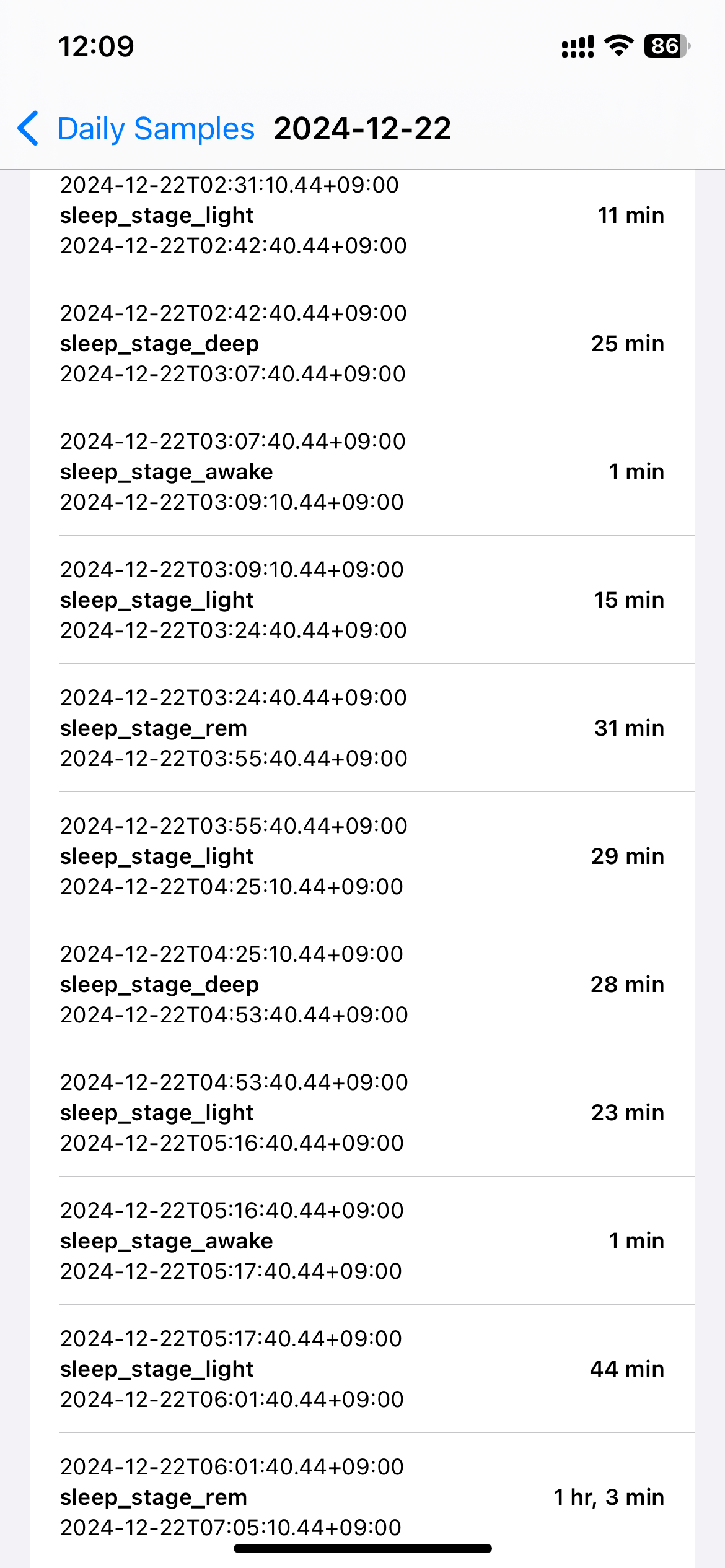Data Integration
Samples
Overview
Sahha provides your app with realtime data samples directly from Apple Health and Google Health Connect.
Samples are an array of events and values that occur within a time period that you specify.
For example:
- a
stepssample which includes step count - a
heartRatesample which includes beats per minute - a
sleepsample which includes minutes spent in various sleep stages

Samples are fetched in realtime
Using the getSamples method will fetch the most up-to-date samples for a SahhaSensor .
This is very useful for monitoring the most recent changes in user activity.
For example, you can monitor changes in a user's heart rate.
If you'd like to check for new data continuously, you can call getSamples(.heartRate) with a timer (for example every 5 minutes).
Limiting the Date Range of Samples
Although the getSamples method is free to use, it still requires time for the device to fetch samples.
The longer the date range you specify for this method, the longer it will take for samples to ready - potentially blocking your UI.
If you are going to call getSamples using a timer, we recommend limiting the date range for new samples to match the interval you are polling (for example every 5 minutes).
Get samples for the last hour
Using getSamples will return an array of samples for the SahhaSensor and time period you specify.
To get samples for the last hour, specify a startDateTime and endDateTime with a one hour difference.
Older samples will be at the start of the array.
Newer samples will be at the end of the array.
// Get samples for the last 24 hours// Add a date range
let today = Date()let lastHour = Calendar.current.date(byAdding: .hour, value: -1, to: today) ?? Date()
Sahha.getSamples( sensor: .steps, startDateTime: lastHour, endDateTime: today){ error, samples in if let error = error { print(error) } else if samples.isEmpty == false { print(samples) }}Get samples for the last day
Using getSamples will return an array of samples for the SahhaSensor and time period you specify.
To get samples for the last 24 hours, specify a startDateTime and endDateTime with a one day difference.
Older samples will be at the start of the array.
Newer samples will be at the end of the array.
// Get samples for the last 24 hours// Add a date range
let today = Date()let yesterday = Calendar.current.date(byAdding: .day, value: -1, to: today) ?? Date()
Sahha.getSamples( sensor: .steps, startDateTime: yesterday, endDateTime: today){ error, samples in if let error = error { print(error) } else if samples.isEmpty == false { print(samples) }}Sample response
Samples are returned as an array of objects in JSON format.
- Parameters :
-
id: UUID for the sample -
type: The type of the sample (steps,sleep, etc.) -
startDateTime: Start date-time in"yyyy-MM-dd'T'HH:mm:ss.SSZZZZZ"format ("2021-10-27T16:34:06-06:00") -
endDateTime: End date-time in"yyyy-MM-dd'T'HH:mm:ss.SSZZZZZ"format ("2021-10-27T16:44:06-06:00") -
value: Numerical value of the sample (100,200, etc.) -
unit: The unit for measuring the value (count,minute,kg,bpm, etc.) -
source: The source which recorded the sample incom.company.appformat ("com.apple.health")
-
For iOS and Android, samples are returned as an array of objects in SahhaSample format.
public struct SahhaSample: Comparable, Codable { public var id: String public var type: String public var value: Double public var unit: String public var startDateTime: Date public var endDateTime: Date public var source: String}Array response
Samples are returned as an array of objects in JSON format.
Older samples will be at the start of the array.
Newer samples will be at the end of the array.
An example response includes these fields:
[ { "endDateTime": "2024-12-19T12:25:53.44+09:00", "source": "com.apple.health.0C1972B1-DBA3-4B25-9FE7-E9C00DF1DCE6", "unit": "count", "startDateTime": "2024-12-19T12:16:16.82+09:00", "value": 111, "type": "steps", "id": "4CD8C605-46CB-4349-B317-FFD984E5015A" }, { "type": "steps", "source": "com.apple.health.0C1972B1-DBA3-4B25-9FE7-E9C00DF1DCE6", "startDateTime": "2024-12-19T12:35:09.56+09:00", "value": 198, "id": "3F16DFB3-6013-452A-95A0-EC89455F9059", "unit": "count", "endDateTime": "2024-12-19T12:40:52.96+09:00" }, { "unit": "count", "id": "AA60B687-18BB-47EA-8541-D9EBE4788B82", "startDateTime": "2024-12-19T12:51:10.59+09:00", "source": "com.apple.health.0C1972B1-DBA3-4B25-9FE7-E9C00DF1DCE6", "value": 47, "endDateTime": "2024-12-19T12:56:36.07+09:00", "type": "steps" }]Empty response
If no samples are found for the SahhaSensor and time period you specify, you will receive an error message.
"No samples found"Using SahhaSensor
Samples are grouped by SahhaSensor type.
For example, use getSamples(.heartRate) to get samples of a user's heart rate.
Choose a SahhaSensor
You must specify which SahhaSensor to use for getSamples.